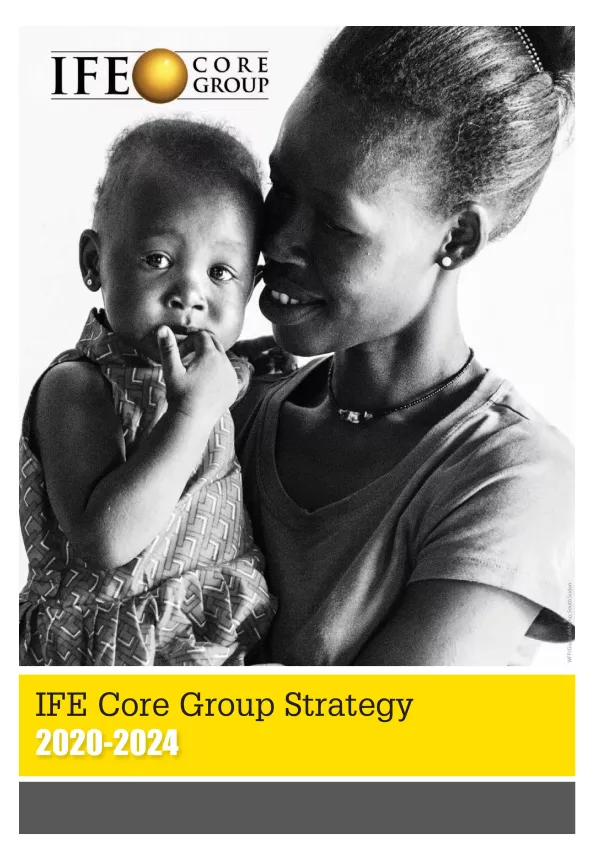IFE Core Group Strategy 2020-2024
Publication details
Introduction
The Infant Feeding in Emergencies (IFE) Core Group is a global collaboration of agencies and individuals that formed in 1999 to address policy guidance and training resource gaps hampering programming on infant and young child feeding support in humanitarian contexts. The formation followed on from a key meeting, hosted by IBFAN in Geneva in 1995 which, while recognising the need for the provision of small amounts of breastmilk substitutes (BMS) in emergency situations, identified the need to protect mothers and children from the indiscriminate distribution of BMS.1,2
The IFE Core Group does not directly implement programmes but rather works to develop guidance and resource materials; documents lessons learned and builds capacity to ensure more effective infant and young child feeding (IYCF)3 support in emergency contexts (IYCF-E). The IFE Core Group members bring challenges and issues to the collective membership for peer support and guidance to facilitate rapid application of up-to-date experience in operations and to connect on-the-ground experiences with the development of agency and global policy guidance.
The IFE Core Group is coordinated by the Emergency Nutrition Network (ENN). Current members of the IFE Core Group include: ACF, ADRA, CDC, CGBI, Concern Worldwide, Eleanor Crook Foundation, ENN, Global Nutrition Cluster, Goal, IBFAN, IMC, IOCC, IRC, MSF, SafelyFed Canada, Samaritan's Purse, Save the Children, UNHCR, UNICEF, USAID, USAID/OFDA, WFP, WHO, World Vision, and a number of independent individuals.
In the twenty years since the IFE Core Group was formed it has developed and updated the IYCF in Emergencies Operational Guidance (IYCF-E OpsG), developed and/or contributed to a number of other guidance and training materials, provided guidance on how to communicate with the media and have held and participated in key meetings and fora.
Recent emergencies have expanded the scope of IYCF issues and modified the ways of working in humanitarian contexts. Crises have occurred in more urbanized, middle income countries where rates of breastfeeding were low (such as Syria), which has necessitated greater consideration and the adaptation of guidance for how to support non-breastfed children and their carers including in camps, transit settings as well as remote support contexts. Evidence shows the effect of stress and trauma (such as due to conflict, GBV, etc) on IYCF practices and the need for coordination with mental health/psychosocial support and sexual and reproductive health services for infants and their caregivers and may require sensitization about Post Traumatic Stress Disorder (PTSD), symptoms, and how frontline practitioners can avoid exacerbating PTSD or re-traumatizing families when providing direct services.
In late 2017, the IFE Core Group held a three-day meeting to review its functioning and identify future activities, funding needs, responsibilities and capacities. The meeting confirmed the important role the IFE Core Group plays, and resulted in the development of an action plan (in 2019) to take forward with a restructuring of the group, and the formation of a number of working groups and the leadership of a Steering Committee. Building on this strengthened sense of direction, the IFE Core Group has prepared this three to five-year strategy to further clarify and define the group's overall aim and objectives, to better articulate where the IFE Core Group's responsibility lies (and where it ends) and to identify key indicators for measuring the progress and outcomes of the work of the group.
1Infant Feeding in Emergencies, Policy, Strategy & Practice, Report of the Ad Hoc Group on infant feeding in Emergencies, May 1999; Crucial Aspects of Infant Feeding in Emergencies and Relief Situations, July 1996, IBFAN Geneva
2 Ad Hoc Group on infant feeding in emergencies. Field Exchange 1, May 1997. p12.
https://www.ennonline.net/fex/1/adhoc
3 WHO recommends mothers worldwide to exclusively breastfeed infants for the child's first six months to achieve optimal growth, development and health. Thereafter, they should be given nutritious complementary foods and continue breastfeeding up to the age of two years or beyond. The International Code of Marketing of Breastmilk Substitutes and subsequent resolutions (the Code), which aims to contribute "to the provision of safe and adequate nutrition for infants, by the protection and promotion of breastfeeding, and by ensuring the proper use of breast-milk substitutes, when these are necessary, on the basis of adequate information and through appropriate marketing and distribution"
